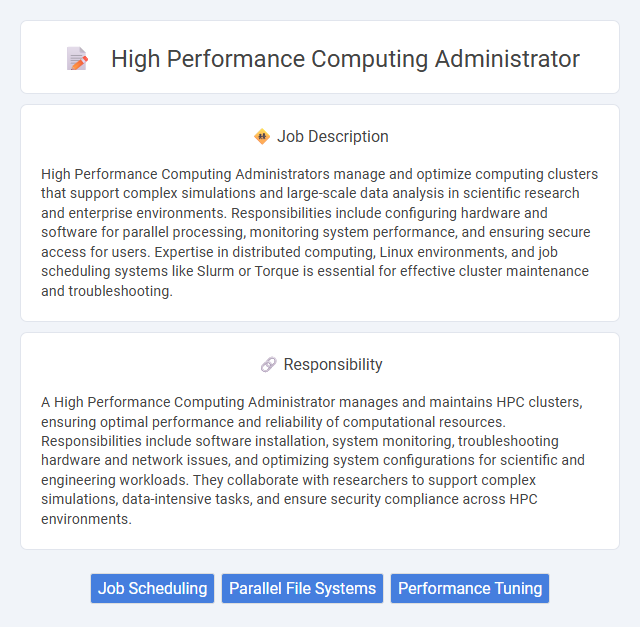
High Performance Computing Administrators manage and optimize computing clusters that support complex simulations and large-scale data analysis in scientific research and enterprise environments. Responsibilities include configuring hardware and software for parallel processing, monitoring system performance, and ensuring secure access for users. Expertise in distributed computing, Linux environments, and job scheduling systems like Slurm or Torque is essential for effective cluster maintenance and troubleshooting.
Individuals with strong technical skills and a passion for solving complex computational problems are likely to thrive as High Performance Computing Administrators. Those who enjoy working in fast-paced environments and have patience for troubleshooting sophisticated systems may find this role suitable. Candidates less comfortable with continuous learning or high-pressure situations might struggle to meet the job's demands effectively.
Qualification
A High Performance Computing (HPC) Administrator must possess a strong background in computer science, with expertise in Linux/Unix systems and cluster management. Proficiency in scripting languages such as Python or Bash, alongside experience with SLURM or PBS workload managers, is essential for efficient job scheduling and resource allocation. Advanced knowledge of network architecture, storage solutions, and performance tuning ensures optimal HPC system functionality and user support.
Responsibility
A High Performance Computing Administrator manages and maintains HPC clusters, ensuring optimal performance and reliability of computational resources. Responsibilities include software installation, system monitoring, troubleshooting hardware and network issues, and optimizing system configurations for scientific and engineering workloads. They collaborate with researchers to support complex simulations, data-intensive tasks, and ensure security compliance across HPC environments.
Benefit
High Performance Computing Administrators likely experience significant career benefits, including access to cutting-edge technology environments and opportunities to enhance technical expertise in parallel computing systems. Their role often offers competitive compensation packages and professional growth potential due to the specialized nature of HPC systems management. Working in this field may also provide chances to collaborate with top-tier research teams, potentially increasing job satisfaction and long-term career stability.
Challenge
Managing a High Performance Computing Administrator role likely demands navigating complex software and hardware issues in fast-paced environments. The probability of encountering unexpected system failures or performance bottlenecks may be high, requiring quick diagnostics and resolution. Strong problem-solving skills and adaptability are probably essential to meet these continual technical challenges effectively.
Career Advancement
High Performance Computing Administrators manage and optimize complex computing systems critical for scientific research, data analysis, and simulation tasks. Career advancement in this field often involves gaining expertise in parallel computing architectures, cloud integration, and cybersecurity, leading to roles like HPC Systems Architect or Chief Technology Officer. Professionals who continuously update their skills with certifications in emerging technologies and contribute to cutting-edge projects position themselves for leadership and strategic innovation opportunities.
Key Terms
Job Scheduling
A High Performance Computing (HPC) Administrator specializes in managing job scheduling systems such as Slurm, PBS, and Grid Engine to optimize resource allocation and maximize cluster efficiency. Proficiency in configuring and maintaining batch scheduling queues, load balancing, and priority management ensures timely execution of computational workloads in HPC environments. Expertise in monitoring job status, troubleshooting scheduler-related issues, and automating job workflows drives high throughput and reduces system bottlenecks.
Parallel File Systems
High Performance Computing (HPC) Administrators specializing in Parallel File Systems manage storage environments crucial for maximizing data throughput and scalability in supercomputing clusters. Expertise in systems like Lustre, IBM Spectrum Scale (GPFS), or BeeGFS ensures efficient handling of concurrent data access across numerous compute nodes. Optimizing parallel file system performance directly impacts computational research, scientific simulations, and large-scale data analytics by reducing I/O bottlenecks and enhancing system reliability.
Performance Tuning
High Performance Computing (HPC) Administrators specialize in optimizing computational systems to maximize efficiency and throughput. Their performance tuning tasks involve analyzing system bottlenecks, fine-tuning hardware configurations, and optimizing software workloads to enhance processing speeds. Expertise in parallel computing frameworks, resource allocation, and network latency reduction is critical for ensuring peak HPC system performance.
 kuljobs.com
kuljobs.com